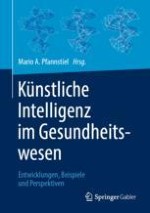2022 | OriginalPaper | Chapter
26. Ist Stimme das neue Blut? KI und Stimmbiomarker zu früheren Diagnose – für jedermann, überall und jederzeit
Authors : Dagmar M. Schuller, Björn W. Schuller
Published in: Künstliche Intelligenz im Gesundheitswesen
Publisher: Springer Fachmedien Wiesbaden
Activate our intelligent search to find suitable subject content or patents.
Select sections of text to find matching patents with Artificial Intelligence. powered by
Select sections of text to find additional relevant content using AI-assisted search. powered by
